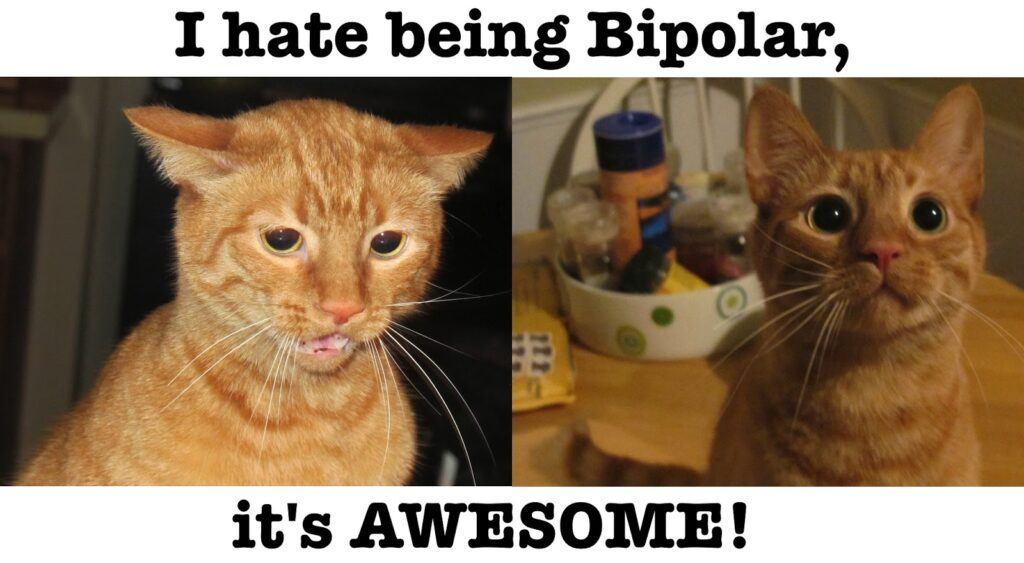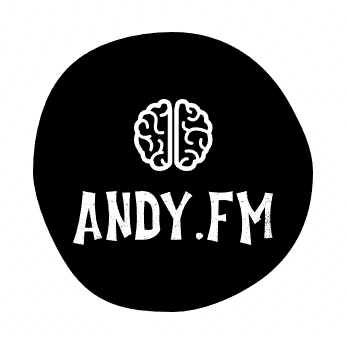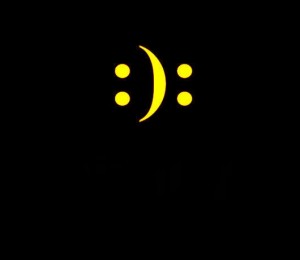Bipolar – ‘manic depression’ (if you’re old school). It’s a pain in the arse, it’s brilliant, it’s un-nerving, it’s soul-destroying, it’s fascinating, it’s life-ruining, it’s life-changing, it’s horrible, it’s inspirational. Yep – it’s a head-fuck.
“And when they were up they were up…and when they were down they were down..” – The Grand Old Duke Of York (Some old dude)
I want to talk about bipolar from my perspective and in terms of how it’s affected my life, and, more importantly, what I’ve learned from it. I’m not a ‘writer’ so this won’t be wonderfully written or constructed. However, I hope it’s of some use to someone, be it a fellow sufferer or someone who’s close to one.
“All I know is light and love
I feel that I could live forever
While others’ troubles seem to grow
I have no problems whatsoever
I hate my life I want to die
I was just pretending all this time
A mask I wear so I don’t bare
My soul to the cold, harsh world out there”
– ‘Bipolar’, Assemblage 23
What Is Bipolar?
To quote from bipolaraware.co.uk: “Bipolar disorder(which is also known as manic depression) is a mental illness involving episodes of serious mania and depression. These can be severe mood swings accompanied by changes in emotions, thoughts, behaviours, physical health and functioning. The mood swings are more extreme and more prolonged than the everyday ups and downs that we all experience. Emotions may vary from from depression and hopelessness through to feeling overly elated(‘high’) or irritable. People usually go through periods of normal mood in between these times.”
That, ladies and gents, is a spot-on description. But, to complicate things, there are various ‘versions’ of it. Which I won’t go into as they’re pretty boring but have a look here if you want. The point is, like any mental illness, it’s different for everyone. My perception of what bipolar ‘is’, is my experience of it – and for me, that’s what’s called ‘rapid cycle’. Whilst this sounds like the setting on a washing machine, it basically means that (at least if not on meds) I can ‘cycle’ between feeling amazingly great and absolutely rock bottom in the space of a day, or whenever.
For others though, they may spend months or more at a time in a high or low state. Sadly for many of us (again, at least when not on meds), the ‘periods of normal mood’ are short and tainted by knowing that it won’t last and will end in a high or low state, as it always does. The unpredictability of bipolar makes it difficult and draining for both the sufferer and the people close to them.
With the case of ‘rapid cycle’ bipolar, this is even more true. Having personally had days where in the space of a morning I’ve felt like I knew the meaning of life and an hour later wanted to end my life, I speak from experience. It’s exhausting, both mentally and physically – and is similarly un-nerving and draining for people close to you. Sadly in our society, despite there being arguably more awareness of mental health issues than previous decades, there are still negative perceptions and stigma about them. Whilst physical issues (e.g. a broken leg) are visible and therefore more ‘legitimate’, mental health issues are hidden to the eye. They’re not quantifiable, they’re not tangible.
Many people sadly get the ‘cheer up’ or ‘grow up’ type comments which do nothing to help the sufferer. Mental health issues in general are huge – with 1 in 4 people suffering from some form in the space of a year, it’s a big deal. Supposedly 5% of the population are bipolar. And of course many, many more suffer from more regular forms of depression and anxiety. Bipolar doesn’t discriminate – it knows no barriers in terms of wealth, race or your job. Causesare generally thought to be chemical or genetic.
No sufferer chooses to ‘get’ bipolar, nor is it anyone’s fault. Whilst there are ways to tackle bipolar to an extent (and I’ll talk about some things that have helped me later on in this article), in my opinion if you do suffer from it, it’s there for life. Maybe behind the scenes, well taken care of with meds, diet, exercise etc. But you can’t get complacent about it – there’s no magic cure and if you’re bipolar then you need to be on the ball and thinking about the immediate future as well as the present moment.
What’s It Like Then?

Again I need to stress that everyone’s experiences are different. Everyone has different brains, personalities and thresholds. So whilst I can say I know what it’s like to be suicidal, that doesn’t mean that I know exactly how someone else is feeling in the same mental state. Also, I’m pretty crap about explaining things but I’ll do the best I can.
It’s great, it’s crap, it’s insightful, it’s beautiful, it’s horrifying, it’s illuminating, it’s alienating, it’s confusing, it’s wonderful, it’s bright, it’s grey, it’s warm, it’s cold.. it’s up, it’s down..You hate it but you love it, you love it but you hate it. It owns you but you own it – it IS you but it ISN’T you..
Confused?
Bipolar – The Lows

A bipolar low is the most dark, empty, barren, stark, nasty place you can be emotionally, mentally, physically and spiritually. One of the sick things about it (for me at least) is that how ‘good’ life really is (as in whether there’s people that love you etc.) doesn’t matter at all at this point. All you can feel is just..pain.. and darkness. Nothing anyone can say makes any difference (which is immensely frustrating for those near you). Your life feels (or, more than feels, just IS in that state) totally worthless and often the only solution seems to be ending it. Typically your energy goes (unless you’re in a mixed episode) and generally nothing seems worth making the effort for.
This can include pretty basic stuff like looking after yourself, communicating with people etc. For me, I always got uber-introverted and introspective, and just ‘looped’ bad feelings and thoughts internally. You see, when you’re that down (and it is more than that, it’s not just feeling a bit ‘low’ – I’m talking rock bottom), you can’t even communicate to someone what it feels like. It’s like a full on, non-stop pain, but it’s a mental one that takes over every fibre of who you are. It won’t shift no matter what. You could be what many people would perceive as successful, fortunate and so on, but to the sufferer in that moment, you are nothing and nobody.
I had a conversation with someone last year about this – someone who had no experience with depression and thus had an ‘outsider’ view. They felt that depressive states were selfish. My initial response was to get defensive about it, but a while later I found myself agreeing, in a way. When I say ‘selfish’ though, I don’t think it’s deliberate. It’s just that in a properly low state, there really is nothing other than what’s going on internally and you just can’t associate or empathise with anyone else, especially if they’re in a ‘normal’ state. Essentially someone in a bipolar low (or high) can’t ‘connect’ emotionally with those close to them, and conversely those near the bipolar sufferer can’t comprehend how bad they’re feeling. Thus you end up with a disconnect whereby the sufferer, as well as feeling rock-bottom, gets frustrated with those around them (for not being able to understand them), whilst those people are frustrated either because they can’t get the sufferer to ‘snap out of it’, or because they desperately want to help the person but can’t, or feel like they can’t.
Feeling suicidal is an…odd feeling. When you’re in a state when you’re actually thinking/planning ending your life, it’s like you’re in this little pocket, outside of normal ‘life’ – you have these secret plans and thoughts and in a way they feel wonderfully liberating as you know if you followed through with them your pain is over. Permanently. Like many things, I think it’s fair to say there’s ‘degrees’ of feeling suicidal – and again, everyone’s experience or perception of it is different. At a guess, I have ‘properly’ considered/planned ending my life on around ten occasions. And thought about it/was near to being serious about it on many occasions. Many bipolar sufferers do end up taking their lives – either because they can’t handle the lows, or, ironically, as they can’t handle the ups.
Suicide offers a guaranteed end to living with bipolar. Sadly of course it also ends any prospect of dealing with it, of living your life, and also robs your loved ones of you. Suicide leaves the people near that person broken – not only have they lost someone, but they also may be stuck with ‘what if’ thoughts about how they may have helped them ‘if’..how they could’ve been there ‘if’… if if if… Apparently 25-50% of biopolar sufferers attempt suicide at least once. And I would imagine many, many more (if not all) of the remainder have seriously thought about it. A studyhas shown around 8% of male bipolar sufferers and slightly less for females, ended in suicide. This is how brutal bipolar it is (as indeed are many other depressions).
The suicide attempt/success rates demonstrate how strong the negative feelings in a low are and how desperate it makes the sufferer wish to escape them. It’s been a relatively long time since I suffered a proper low but I remember how soul-crushing it was – it really consumes every part of your being and refuses to let go. It’s like the world is carrying on around you as normal – people going to work, enjoying their lives etc. – such normality becomes both surreal and banal. You become outside looking in (and conversely inside of yourself looking out) to this other world which you can’t connect with and that you don’t belong to.
Bipolar – The Highs

Ah, the highs, now we’re talking! Again a ‘high’ phase (be it an hour, or months long) is different for everyone, as is the proportion of highs to lows (annoyingly I get way more lows than highs!). A bipolar high is like a huge rush of energy, thoughts, ideas, happiness and bliss. You can feel like you’ve just come up with a great idea that’s going to solve your financial problems, or that you know the ‘secret’ to life. You could go and run for miles, solve the world’s problems, you’ll be happy forever.
Whoooop! Sounds good right? Yeah it is! However the problem is – it’s impossible to slow down, to concentrate, to focus, to communicate. I remember in a couple of ‘highs’ I could do something like look at the sky on a summer day and be instantly convinced I had the secrets of the universe…..but I had no idea what they were or how to explain them! The increase in both mental and physical energy can be incredibly tiring for people around you who can’t keep up.
Their ‘failure’ to keep up becomes a source of resentment for the sufferer – how dare people not understand how great life is and how we can fix everyone’s problems! As for slowing down – forget it – impossible. So ironically whilst the ‘highs’ produce what feels like a great deal of creativity and ideas, nothing comes of it (for me at least) as it’s impossible to sit still/achieve any mental clarity for long enough to do anything. The increase in physical energy often manifested itself with me in decreased sleep, as I often couldn’t slow myself down or shut off my mind for the night.
During one episode (which technically was a ‘mixed’ one) I was running and doing weights like a lunatic but still couldn’t tire myself out. I think at one point (this was summer of 2009) I was getting 3-4 hours sleep per night, it was crazy. ‘Highs’, however, can feel so great that many sufferers then don’t want to get help with their illness, as they don’t want to let them go. Illicit drug use (e.g. stimulants) are also prevalent in these cases, allowing the person to extend the high, albeit artificially. Also, even if they did want to get help, it’s almost impossible to calm down enough to have the clarity to take action.
Bipolar – Mixed Episodes
 One of the most confusing elements of bipolar is when you get a mix of high and low, rolled into something called a ‘mixed episode’. Bipolar is bewildering and annoying at the best of times but when you have both extremes messing with you at once it’s a recipe for disaster!
One of the most confusing elements of bipolar is when you get a mix of high and low, rolled into something called a ‘mixed episode’. Bipolar is bewildering and annoying at the best of times but when you have both extremes messing with you at once it’s a recipe for disaster!
As I mentioned above, I’ve suffered from this before and it was one of the most confusing, exhausting times of my life. I was dealing with feeling emotionally rock bottom – which is normally accompanied by physical lethargy, but in this case came with LOADS of energy – energy that no matter what I did, wouldn’t burn off. This meant precious little sleep, which made me feel worse and worse. Sounds like a pain in the ass right? It is!
Things I Find Helpful To Do & Avoid
Whilst I certainly think that anti-depressants/mood stabilizers are usually needed in bipolar sufferers, there’s also plenty that can be done both in terms of prevention and treatment of symptoms and episodes. Again, this requires the sufferer to take ownership of the illness and take simple steps to look after themselves. Done consistently, I believe this can make a huge difference. Neglected, however, and things can rapidly fall apart.
Put simply – if you want to get better and stay better – you have to invest time into the ‘basics’. These can be boring but it has to be done – consistently – every day. It pays off!
Exercise

Key for me has been ensuring I exercise regularly. This helps both to improve my mood and also maintain it. This is something that has to be done pro-actively rather than re-actively – as during a low it can often feel impossible to have enough energy to exercise, or feel like it’s worthwhile. Specifically, what works wonders for me is running, and especially long distance running. I’ve been running on and off for some years now. Having had over a year ‘out’ from training, I started up again a couple of months ago and it’s made me realise what a huge difference it makes. Helping to relieve stress, getting you out of the house, out of ‘ruts’ of moods and also providing a ‘runners high’ from endorphins etc., it’s an easy and cheap way to feel better.
Walking is also good – basically anything that gets you moving and, ideally, out of the home. Sitting inside in the spiral of depression isn’t good for your body or your mind. Getting out, moving, using up energy and letting off stress also allows you to gain perspective on your situation. Sadly it’s all too easy to just stay in all day and night if you can, rotting away feeling crap. Exercise is one of those things you need get in the habit of whilst you’re feeling ‘OK’ – as a preventative measure. Weight training is also a good one and great for letting off steam as well as improving the self-image of your body.
Really, any sort of exercise is going to be beneficial – it’s just a matter of doing it – regularly. It needs to be a core part of your routine, even if you find it boring. Think of it as important as taking your meds each day. Find an exercise/sport you enjoy (running, swimming, cycling, whatever) and it’s way easier.
And if you have a dog, you have no excuse! 🙂 Get moving, bitches!
Diet & Food

Another core factor in your life is what you eat, and what you don’t eat. If you’re constantly loading your body up with crap, it’s no wonder your mood is crap too. In the winter months especially (when many sufferers find it even more difficult due to the lack of light) it’s so easy to give in to our bodies want for ‘comfort foods’ that are high in fat and/or carbohydrates. This makes us feel good in the short term but plays havoc with our body and causes weight gain and drop in energy.
I know from experience that my diet plays a huge part in my moods and wellbeing. One thing that can set me off in a big way is eating refined sugar. Strangely some formats seem OK but things like cakes etc cause havoc in my brain, meaning I can’t concentrate, think coherently, get high then irritable and then ultimately depressed. All from food. Conversely, I know that a diet higher in protein (especially in the morning), and high in fruit and vegetables (easier for me as I’m vegan), along with a few supplements (flax oil, brewer’s yeast, vitamin B) works well. I keep the level of carbohydrates reasonably low and this seems to help me avoid blood sugar ‘crashes’.
Like exercise, diet has to be seen as a fundamental part of your life, and again something you need to plan for when you’re feeling ‘OK’ – if you wait until you’re totally depressed, you won’t care! It’s a matter of experimenting and trying things out. I’d certainly suggest though that any sufferer either cuts out entirely, or radically reduces, their refined sugar intake, as well as ‘crap foods’ like crisps, chips, etc. Vitamin B has often been associated with mood disorders and depression. I take a Vit B complex each day and I believe this helps me concentrate at work and reduces the risk of me feeling low.
Meditation
Something I’ve got into fairly recently is meditation and this has had a huge impact on my state of mind, mental clarity and productivity both in my work and home lives. I’ve always been someone who’s found it hard to stop my mind from going off in a million directions at once so I don’t find it easy. I try to do short bursts (like counting 50 really slow breaths) and build up from there. I really notice on the days I don’t do it that I have much less clarity. Meditation, even at a basic level, gives me the ability to prioritise tasks, and just calm down, helping to avoid ‘hyper’ phases, whilst also giving me perspective on any issues I’m experiencing. Try it, even if you just do it for a minute each day and then build up from there.
Alcohol & Drugs (Legal & Illegal)
It’s got to be said though it’s probably very obvious – bipolar and any form of depressant or stimulant is not a good idea. The problem is, many sufferers use substances to ‘self medicate’ – either to improve mood, prolong a high, or just to get them to sleep or stop thinking. This often leads to dependency and addiction. Being bipolar and also sober/drug free isn’t easy. Frankly, it’s not easy anyway in our society as it’s not the ‘norm’. But being both is pretty scary as you can’t really ‘cover things up’ by drinking yourself into oblivion and so on.
The fact is though, that is pays off in the long term. Being ‘straight’ or whatever you want to call it means you have a more rationale outlook and perspective on your condition. If you’re drunk and feel down, for example, is that due to the drink or your mood? Or both? If you’re feeling great, is it because you’ve snorted coke, or because you’re on a bipolar high? Alcohol and drugs, in my opinion, play a similar role to sugar – they play havoc with your brain and body, causing jumps in energy, blood sugar, followed by crashes. Your body and brain struggle to keep up, as do you.
Drugs are bad, m’mmmkay?
Lightboxes
Whilst this isn’t exclusive to bipolar, many of us get really bad lows during the dark winter months (you may have heard or seen the term SAD – Seasonal Affective Disorder). I get this every year – typically just after the clocks change – I just want to sleep all day.
This winter I decided to invest in a lightbox – and I have to say it’s made a huge difference to my levels of energy and alertness during the day. I work from home so I’ve been using it for around three hours in the morning and two in the afternoon. This was the one I got – £100ish well spent:
Meds

There are a large number of prescription medications available for depression and bipolar, including anti-depressants and mood stabilisers. Some people are prescribed one, many a combination. It’s far from an exact science, and part of the process of improving things unfortunately involves having to try different medications and combos. Each one may come with its own side effects, work well, or not work well at all. It’s a pain in the arse.
Personally I don’t like taking meds – I don’t like the concept and I don’t like having ‘heavy’ chemicals like that in my body. But I do take meds because I know from years of experience that if I don’t, I’m a total mess. I put it off for years and years until it got to a point where ‘enough was enough’ and I had to decide between continuing to feel suicidal and probably harming myself very seriously, or taking the plunge with meds.
With meds, again there’s a stigma still out there – people (the sufferer or non-sufferer alike) may percieve that it’s ‘weak’ to take a pill for something intangible. The truth is, a hell of a lot of people are on meds. It’s a mainstream tool for dealing with various mental issues, but not one many people openly talk about.
I don’t think there’s anything ‘wrong’ with taking meds, provided they’re appropriate and have been explained properly to the patient. Whilst there are plenty of awesome doctors out there, there are some which don’t deal with mental health issues well, or churn out anti-depressant scripts without thought. Many people don’t have side effects explained to them and/or aren’t told about how awful it can be ‘cold turkeying’ from them if they want to come off them. Sadly that’s probably symptomatic of the NHS under pressure and GPs not having time to give proper consultations.
Side effects can be a real bitch, make no mistake. The odd thing about meds is that some people may get loads of side effects from a given med, whilst some may get none, or get totally different ones. These might be nausea, shakey hands, and, annoyingly, the common one of weight gain. With the latter, this can make things even worse as many sufferers already have issues with their body image.
I hate side effects as much as the next person but I take the view of balancing them up with the option of not being on meds at all – and when I do that, meds win every time.
Oh yes, did I mention you have to take your meds every day? EVERY day.. don’t fall into the trap of ‘oh I feel better’..it doesn’t work like that!
Finally – Be Your Number One Advocate
Wherever you live (I’m UK) – resources for mental health vary drastically. Here in the UK, although we’re fortunate enough to have the NHS, budgets are limited and hospital beds scarce. This means that treatment leans heavily towards medication.
My experience has been that, if you want to get help, or information you HAVE to take ownership and be assertive. Without that, you’re not influencing things, you’re not applying pressure to get help, you’re promoting your own cause. No matter how crap you feel, if you want help, you have to work at it.
Ironically, this can mean that you don’t ‘present’ as someone who’s mentally ill. I’ve had several times where I’ve calmly explained to doctors or medical staff that I’m suicidal and need help – whilst communicating well, maintaining eye contact and to all intents and purposes, having a ‘normal’ conversation. I’ve learned over the years you have to push to get things – for me, that meant pushing to finally see a consultant who could then actually spend time with me to find an appropriate medication.
You have every right to influence your health care and treatment – use it and don’t ever feel that you should be apologetic about it. Always make sure that in any appointment, you have got across any point you wanted to, that you feel the doctor understood you, and that you understand the proposed treatment and future plan (e.g. follow up appointments, etc.)
Bipolar – Things to Take Away
- Bipolar can happen to anyone
- Bipolar doesn’t mean you’re crap, weak or worthless
- Take ownership of your condition and be your own advocate
- Experiment with things to make you better
- If your doctor sucks, try another
- Don’t let it consume or define you – you are more than a condition
- Talk to people, share your experiences and help each other
- Work on the fundamentals every day – diet, exercise, meds
- Let your loved ones help you
- Educate yourself – read books, forums (contribute as well as read), watch stuff about it
- Maintain a sense of humour
- Never apologise for your condition
- Never, ever EVER feel ashamed
- Oh yeah, stop listening to depressing music!
Useful links and resources
- http://www.bipolaruk.org.uk/
- Psychforums: http://www.psychforums.com/bipolar/
- http://www.bipolaraware.co.uk/
- http://www.nhs.uk/Conditions/Bipolar-disorder/Pages/Treatment.aspx
- Meds: http://www.helpguide.org/mental/bipolar_disorder_medications.htm
- Great forum: http://www.takethislife.com/
- Up/Down (Documentary online) http://www.youtube.com/watch?v=eyiZfzbgaW4
Bipolar books
- Madness – A Bipolar Life (AWESOME book)
- Detour – My Bipolar Road Trip in 4d (love it, she’s a great writer)
- An Unquiet Mind
Famous People Can Be Bipolar Too!

